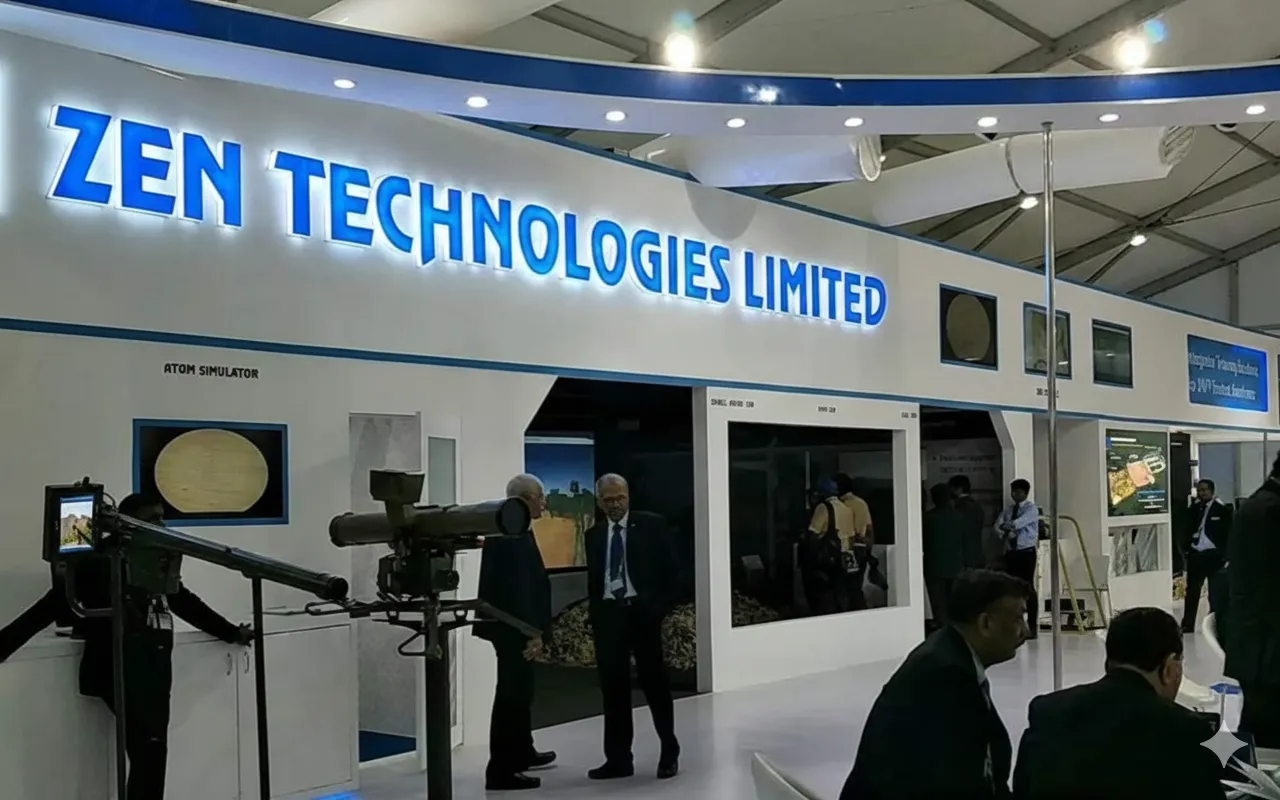Zen Technologies Limited, a Hyderabad-based leader in defense training simulators and anti-drone systems, announced its Q2 FY2026 (July–September 2025) financial results on October 25, 2025. The company reported a strong standalone performance, driven by the steady execution of defense contracts and continued demand from government agencies. However, consolidated results were affected by the deconsolidation of its subsidiary, AI-Turing Technologies.
With a robust order book of ₹675 crore and increasing focus on indigenous defense solutions, Zen Technologies remains well-positioned for sustained growth in India’s rapidly evolving defense manufacturing ecosystem.
In this article, we’ll break down Zen Technologies’ Q2 FY2026 results, highlighting key financial metrics, order book updates, and management commentary on future growth opportunities.
Key Highlights Table
| Metric | Q2 FY26 | Q2 FY25 | YoY Growth |
|---|---|---|---|
| Revenue | ₹1,246.5 crore (standalone) | ₹834.6 crore | +49.36% |
| Net Profit | ₹46.16 crore (standalone) | ₹62.25 crore | -25.84% |
| EBITDA | Not disclosed | Not disclosed | N/A |
| EPS | ₹6.61 (consolidated) | ₹6.74 | -1.92% |
Note: Consolidated figures include a one-time impact from AI-Turing deconsolidation.
Management Commentary
Ashok Atluri, Chairman and Managing Director of Zen Technologies, said:
“Our Q2 FY26 performance demonstrates strong execution across core defense simulation programs. The momentum in order inflows and government focus on indigenization continues to support our growth trajectory. With a robust pipeline and new opportunities in anti-drone and electronic warfare systems, we are confident in our long-term vision.”
The management reaffirmed the company’s FY26 growth guidance, aiming to reach cumulative revenues of ₹6,000 crore between FY24 and FY26, supported by indigenous manufacturing and expanding export demand.
Segment Performance
- Standalone Business:
The core defense simulation segment recorded 49% YoY revenue growth at ₹1,246 crore, driven by strong execution of contracts for the Indian Army and Air Force, including Integrated Air Defence Combat Simulators (IADCS).
Profitability was impacted by higher R&D investments and operational costs. - Consolidated Performance:
Revenue stood at ₹1,735 crore, down 28% YoY due to the AI-Turing deconsolidation (stake reduced from 51% to 49%).
A one-time exceptional gain of ₹94.24 lakh was recognized during the quarter. - Order Book:
Total orders as of September 30, 2025, stood at ₹675 crore, ensuring strong revenue visibility for FY26.
Market Reaction
Post-announcement, Zen Technologies’ stock traded steady with mild investor caution following the one-time accounting impact.
As of October 25, 2025, the company’s market capitalization stood at approximately ₹12,600 crore, reflecting a 17.8% decline over the past year due to volatility in the defense sector and delayed government tender cycles.
However, analysts expect sentiment to improve as execution momentum picks up in H2 FY26.
Peer Comparison
Compared with peers like Data Patterns, Paras Defence, and Astra Microwave, Zen Technologies stands out for its high-margin defense simulator portfolio and consistent domestic order inflows.
While peers have a broader product mix, Zen’s specialized focus on simulation and anti-drone systems gives it a unique edge in the Make-in-India defense narrative.
Future Outlook
Zen Technologies aims to leverage its strong R&D base and government push for indigenous defense equipment to expand across global markets.
The company’s diversification into AI-driven training systems and autonomous defense tech is expected to support medium-term profitability.
Management remains optimistic about FY26, expecting steady order execution, new tenders in anti-drone systems, and strong export demand to drive performance.
FAQs
Q1. What was Zen Technologies’ net profit in Q2 FY26?
Zen Technologies reported a standalone net profit of ₹46.16 crore, down 25.8% YoY.
Q2. Did Zen Technologies beat market expectations?
On a standalone basis, revenue exceeded expectations, though consolidated profit was impacted by the AI-Turing restructuring.
Q3. How did margins perform this quarter?
Operating margins were steady on a standalone basis but slightly compressed at the consolidated level due to higher R&D and restructuring impact.
Q4. What is Zen Technologies’ current order book?
As of September 30, 2025, the order book stood at ₹675 crore, providing strong visibility for upcoming quarters.
Q5. What are Zen Technologies’ key focus areas for FY26?
The company is focusing on anti-drone defense systems, AI-powered simulators, and exports to friendly nations under India’s defense partnership programs.
Conclusion
Zen Technologies’ Q2 FY26 results highlight a strong underlying performance in its defense simulator and anti-drone business, supported by a healthy order book and stable margins.
Despite short-term consolidation effects, the company’s long-term fundamentals remain solid, with strategic focus on R&D, indigenization, and expanding defense exports.
For investors, Zen Technologies continues to be a key defense play in India’s Atmanirbhar Bharat initiative, offering sustainable growth potential in the years ahead.
Sources: Zen Technologies Investor Presentation











